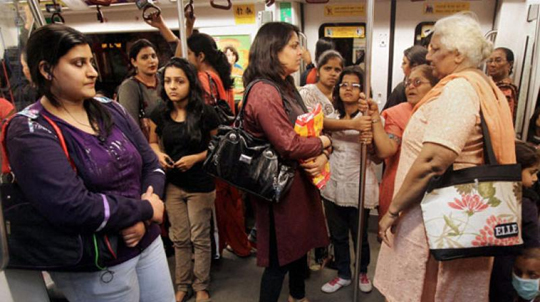Washington/New Delhi, Mar 29: Sexual harassment remains a pervasive problem in Delhi despite tougher laws being enacted after the gruesome Nirbhaya rape and murder case in 2012, according to a new study that found 40 per cent of female respondents were sexually harassed in the past year.
About 40 per cent of women surveyed in Delhi said they have been sexually harassed in a public place such as a bus or park in the past year, with most of the crimes occurring in the daytime, researchers said.
Further, 33 per cent of women have stopped going out in public and 17 per cent have quit their jobs rather than face harassment in public places.
"What this means is that women, despite Nirbhaya, are still afraid," said Mahesh Nalla, from the Michigan State University in US.
Nirbhaya became the pseudonym given to the gang rape victim whose death in 2012 brought worldwide attention to violence against women.
"Women in India do not feel safe being in public spaces, which is clearly a human rights issue," Nalla said.
While sexual harassment is a problem experienced by women worldwide, it may be more prevalent in emerging democracies such as India and other countries in South Asia where women are becoming more involved in the workforce, said Nalla.
"The problem is intensified by the existence of a cramped, inadequate public transportation system, massive youth migration to urban areas and the fact that India is a traditional patriarchal society where many still believe a woman's place is in the home," he said.
Nalla and Manish Madan, assistant professor at Stockton University, surveyed about 1,400 men and women in the capital city of New Delhi on a host of issues including perceptions and history of sexual harassment, use of public transportation, safety in public spaces and police effectiveness in dealing with these concerns.
Researchers found that 40 per cent of female respondents were sexually harassed in the past year and 58 per cent were sexually harassed at least once during their lifetime.
Respondents were asked to gauge the seriousness of sexual incidents ranging from whistling to asking a woman for sexual favours to patting her buttocks or squeezing her breasts.
While both men and women generally considered all incidents serious, men considered them considerably less serious, illustrating "a disjunction between how males and females think," Nalla said.
Sexual harassment of women in public spaces in India and elsewhere in South Asia - known as "Eve teasing" - has long been a common occurrence, particularly by groups of young male perpetrators, he said.
The December 16, 2012 rape and murder of Nirbhaya by a group of men on a moving bus in Delhi brought about new laws for rape and criminalised voyeurism and stalking.
However, despite these efforts, sexual harassment continues on a broad scale, the study suggests.
The research was published in the journal International Criminal Justice Review.








Comments
Dilliwaalis.....oh my god.....attitude in public n exposure in our Mangalore specially medical students in our local areas...UN acceptable...
Pgs living in private building in residential areas 90% drink and roaming out with yaars at nights ...MIS behaving in front of families n kids and in malls is disgusting..they invite public to harass them in any ways...god save our local girls not to learn their attitude and their behavior...
Add new comment